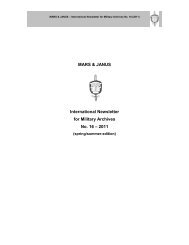National Experiences - British Commission for Military History
National Experiences - British Commission for Military History
National Experiences - British Commission for Military History
You also want an ePaper? Increase the reach of your titles
YUMPU automatically turns print PDFs into web optimized ePapers that Google loves.
110 ai r p o w e r in 20 t H Ce n t u ry do C t r i n e s a n d em p l o y m e n t - nat i o n a l ex p e r i e n C e s<br />
was proposed to offer Italy (via the Supreme War Council at Versailles) a considerable<br />
quantity of raw materials <strong>for</strong> its aviation industry in return <strong>for</strong> supplying Britain<br />
with large numbers of Caproni bombers, amounting to half Italy’s output of the<br />
planes. In June 1918, Churchill (Minister of Munitions) asked Caproni <strong>for</strong> 50 of his<br />
planes. However, the war ended be<strong>for</strong>e anything came of these moves.<br />
What precisely did Caproni and his representatives say when they came into contact<br />
with <strong>British</strong> airmen? (Un<strong>for</strong>tunately but not surprisingly, no verbatim records<br />
of any of these discussions seem to have survived). If we assume that these discussions<br />
were like so many others, and that Caproni spoke much as he wrote, we can<br />
be pretty certain as to what was said. Conclusive evidence is provided by a contemporary<br />
report on Caproni’s ideas which I have discovered among the records of the<br />
old Air Historical Branch at the Public Record Office. This 700 word report, which<br />
was made at first-hand by the Belgian <strong>Military</strong> Attaché in Rome (and endorsed by<br />
the Belgian Minister of War), was with the Operations Branch of the <strong>British</strong> GHQ in<br />
France at the very beginning of 1916. The report, which is in French, is an admirably<br />
accurate and clear exposition of Caproni’s ideas, as compared with more famous<br />
expressions of those ideas; in this report there are unmistakable echoes of Douhet.<br />
It is very doubtful that any notice was taken of this particular report, either at<br />
the time or later. However, it is an important testament to Caproni’s standing, to his<br />
skill as a lobbyist, as well as to both the existence and closeness of the international<br />
aeronautical community. And it raises certain questions: Is it conceivable that this<br />
report was the only report on Caproni’s ideas ever to be seen by <strong>British</strong> eyes? What<br />
about his three famous and lengthy wartime memoranda - one <strong>for</strong> the Allied General<br />
Staff (1916; in English), one <strong>for</strong> the American Air Service (1917), and one <strong>for</strong> the<br />
French President (1918; in French). What about the book “Let us kill the war: let us<br />
aim at the heart of the enemy”, published (in English) in 1917? This book, which<br />
was quoted in the “Times” and which was widely disseminated amongst US airmen,<br />
was written by Caproni’s friend Nino Salvaneschi, although the ideas are clearly<br />
Caproni’s. And, above all, did no <strong>British</strong> Attaché, or visiting <strong>British</strong> airman, likewise<br />
meet Caproni, be impressed by the man and his ideas, and disseminate those ideas<br />
among colleagues and superiors?<br />
It is now largely <strong>for</strong>gotten that in the period 1917-18 a <strong>British</strong> Army Corps, as<br />
well as large RFC (in the north) and RNAS (in the south) contingents, served in<br />
Italy. This situation clearly provided a very great opportunity <strong>for</strong> the dissemination<br />
of the ideas of Douhet among many <strong>British</strong> airmen. The last commander of the RFC<br />
contingent was Phillip Joubert. Joubert was intimately associated with the RAF Staff<br />
College in the inter-war period, first as instructor (1922) and then as commandant<br />
(1930). Given the fact that, in 1918, Douhet was one of the heads of Italian <strong>Military</strong><br />
Aviation, there must at least be the possibility that Joubert and members of his staff<br />
came into contact with Douhet. Undoubtedly, <strong>British</strong> and Italian airmen would have<br />
met regularly, both officially and unofficially; and it is entirely possible that members<br />
of the <strong>British</strong> air contingents became familiar with the ideas of Douhet at this



